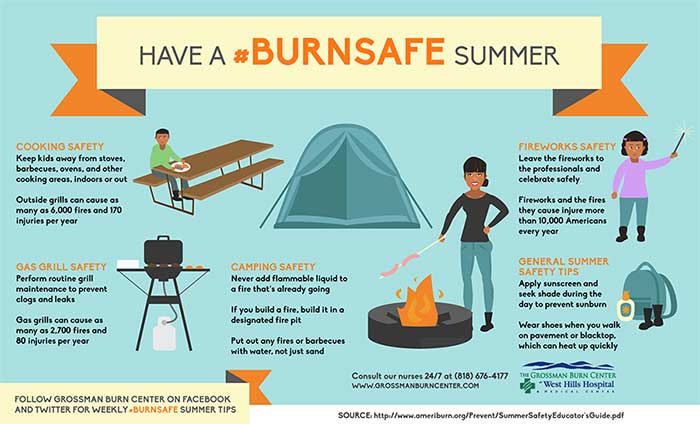Information shared on behalf of the Grossman Burn Center at Research Medical Center via the American Burn Association: Community Fire & Burn Prevention Programs and Summer Burn Safety Campaign
Prevention is the key to Summer Sun Care. Are You Getting the Most out of your Sunscreen?
- Use a sunscreen with a Sun Protection Factor (SPF) of at least 15. Make sure it has both UVA and UVB protection. Re-apply every 2-3 hours, as well as after swimming. Pay particular attention to the most exposed parts – the face, neck, ears, shoulders, back, knees and tops of feet.
- Read and follow the manufacturer’s recommendations on the bottle or tube of sunscreen. Check for its expiration date.
- If applying more than one substance (i.e. insect repellent) on your skin, always put the sunscreen on first and wait 30 minutes before applying the second substance.
- No sunscreen provides 100% protection. Even after applying sunscreen, cover up with a hat, long-sleeve shirt and pants during extended periods in the sun.
If you do get burned, below is some helpful first aid:
- Apply cool baths or cool compresses for 10 to 15 minutes several times a day. Small children may become easily chilled, so keep the water tepid.
- An over-the-counter pain medication such as acetaminophen (Tylenol, for example) may be helpful (Note: aspirin should not be given to children).
- Call the doctor for severely painful sunburn, fever over 101 F (38 C), sunburn in an infant less than 1 year old, multiple blisters or cloudy blisters, which may be infected. Seek immediate care if the child has eye pain, cannot look at lights, looks sick, is dizzy, faints when standing, or has signs of dehydration (dry mouth, no tears when crying, no urine output for eight to sixteen hours, or dark-colored urine).
- Moisturize effected areas liberally and often with perfume-free, alcohol-free lotion.
- On the first day of sunburn, offer extra fluids to prevent dehydration; avoiding alcoholic beverages or those with caffeine.
- DO NOT apply petroleum jelly, ointment or butter to the sunburn. They make the symptoms worse and do not allow air to assist in healing.
- DO NOT wash burned skin with harsh soap.
- DO NOT use over-the-counter creams and sprays that may contain benzocaine. Benzocaine often causes an allergic reaction, especially in children.

Cooking Safety
Keep kids away from stoves, barbeques, ovens and other cooking areas. Indoors or out. Outside grills can cause as many as 6,000 fires and 170 injuries each year.
Gas Grill Safety
Perform routine grill maintenance to prevent clogs and leaks. Gas grills can cause as many as 2,700 fires and 80 injuries per year.
Camping Safety
Never add flammable liquid to a fire that's already going. If you build a fire, build it in a designated fire pit. Put out any fires or barbeques with water, not just sand.
Fireworks Safety
Leave fireworks to professionals and celebrate safely. Fireworks and the fires they cause injure more than 10,000 Americans every year.
General Summer Safety Tips
Apply sunscreen and seek shade during the day to prevent sunburn. Wear shoes when you walk on pavement or black top, which can heat up quickly.
